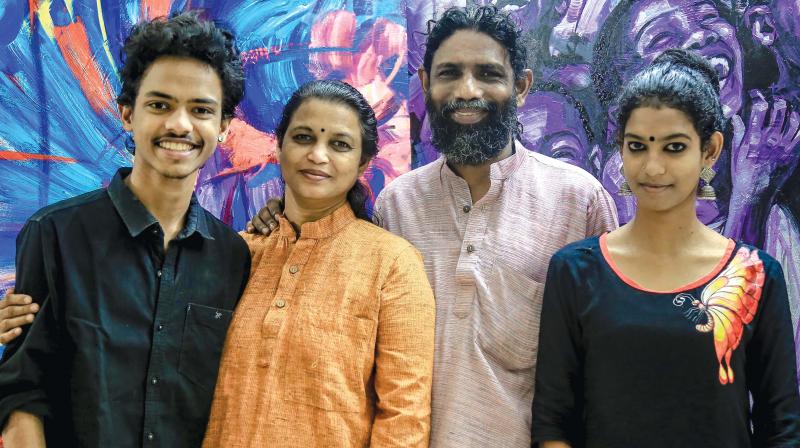The unconventional: Opting for the alternative
This is the story of a family following an unconventional lifestyle.

If he has to move in his grave every time his name is said, poor Robert Frost would never have rested. It all goes back to a poem he wrote, of two roads that diverged in the woods and the traveller taking the road less travelled by. Troubling good ol’ Frost again as Kerala Chronicle completes seven years, we look at the lives of those people who chose to be unconventional
John Baby can’t pick out a day or an instance when everything changed, became different, became systems he wanted to boycott. He dreamed like every child and had a lot of questions. John came from an Orthodox Christian family and grew up learning to be a farmer. His questioning mind began denouncing what he couldn’t agree with — caste, religion, industry. John had decided to be a bachelor for life until he turned 35 and thought he could find a secular someone like him. Mini came into his life with similar ideas. Together, they went against every norm to get married. They chose the most inauspicious time and day they could to register under the Special Marriage Act — on November 13, a Friday, at ‘raahu kaalam’. They didn’t crumble to the pressures of society and followed their preferred unconventional ways when they had children, not even sending them to school.
“We first thought we will not have children. And that if at all we had children, we’d let them grow up according to their wishes. No child asks to be born,” John says. Their children — Minon and Mintu — didn’t go to schools or places of worship. John made them toys, told stories, gifted them with many books. When the parents made food, the children joined to cook. Minon and Mintu grew up loving art, watching their dad paint and mom sculpt. “We realised even as we were very young that it was a different way of life,” Minon says. “We looked at other children and saw they were going to school and we weren’t, they went to church, we didn’t. Till I was about 10 years old, I spent most of my time in forests. We’d travel to the woods every so often, live with the tribal people. Yes, I did miss school sometimes, since I never went there. But the world our parents created for us brought us so much of confidence, helped us learn so much. To put it simply, when others read about Mullaperiyar to understand the problem there, we actually went there. I think it’s the others who should be missing our world.”
The idea was that they should enjoy the best part of their life — childhood, says Mini. “Even now, I remember my childhood days so fondly.” Mini’s own childhood was mostly spent in a convent school where she studied. But even then she found herself distancing from religious rituals. She was sure she would marry only a man with similar interests. Mini was 30 when she met John. They decided that they will never be the kind of parents who imposed their own wishes on their children. “They would have their own dreams, individualities. We wanted them to be with us and come wherever we went till they turned 10. And then we thought we will get them to learn to read and write and choose what they wished to do. But then they began reading and writing as early as when they turned four.”
Minon and Mintu got every freedom to choose the life they wished for. Minon picked up paint brushes and Mintu loved to dance. She is now 16 and is learning Kuchipudi under Sreelakshmy Govardhanan. For Minon, the biggest desire — it is more than a desire he says — is to be an artist. He had more than 60 exhibitions before Sidhartha Siva picked him to play the child protagonist in 101 Chodyangal, a film that won him the national award for best child artist in 2012. By now he has played small and big roles in about 30 films. But as always, Minon speaks very maturely when he reveals he wants to direct more than act. He merits his growth to the days and months he spent in the woods. “Kaadu (forest) influenced me the most. It purifies us. It has a lot to tell us. My parents were just following a known educational psychology when they brought us close to soil and water and nature.”

